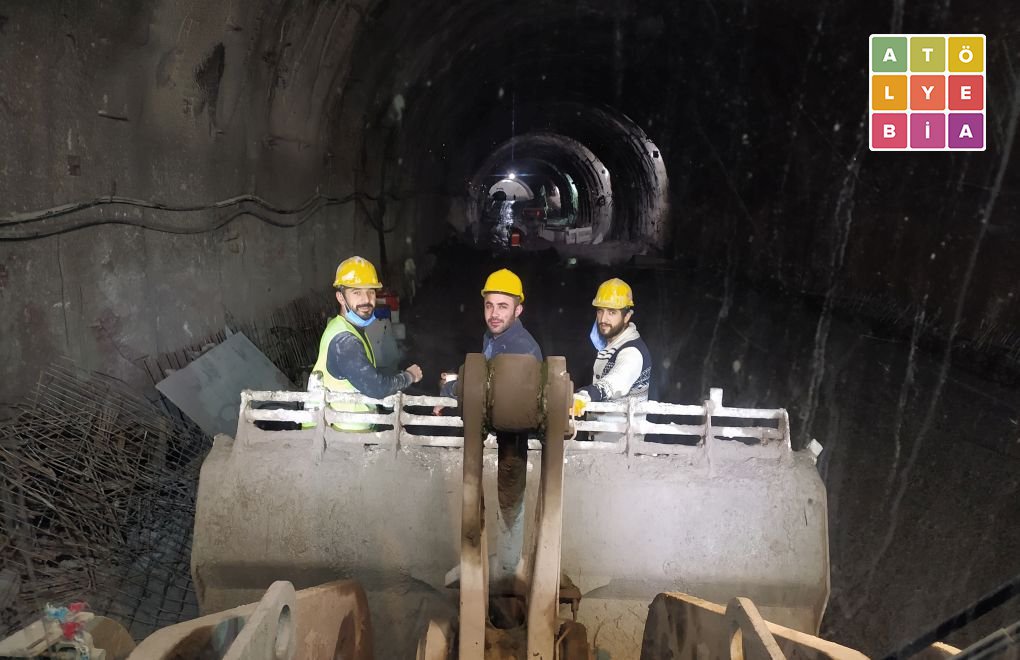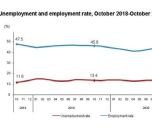* Photos: Serkan Ermin
Click to read the article in Turkish
Some studied journalism, another one graduated from the department of archeology, one is a paramedic while the other is an interior architect...
They are now all together excavating a tunnel at the construction site of Ankara-Sivas High-Speed Rail Line in the Central Anatolian province of Kırıkkale. Other workers call them "the shift of university graduates."
As a matter of fact, they epitomize the scale of unemployment among the university graduates in Turkey, especially in a period when brain drain is discussed and people have more and more concerns about the future.
'They ask for references or experience'
Uğur Eke is 24 years old. He graduated from the Department of Journalism at Fırat University in 2018. After being unemployed for 2 years, he applied for the job when he saw the advert for a tunnel construction.
"After I graduated from university, I made several job applications to work as a journalist. They either asked for references or experience. I had neither of them," says Eke, sharing the following details about his time from the university to the construction site of the tunnel:
"Economic hardships and unemployment in the family left me in the middle of a wreck. I directed my attention to the jobs other than my own profession. 3-4 months ago, I applied to work as a tunnel worker. What was the saddest of all was to enter the tunnel, leaving my diploma at the gate."
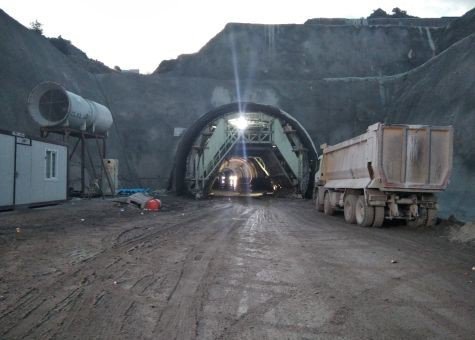
* Construction site
Eke wakes up at 6.30 in the morning everyday and he keeps working until 7 in the evening. He says:
"While I am working here, I can better understand how the countries that see no sun feel. Because the sun is not in the sky when you go to work or you are back from work. What we earn is a little more than the minimum wage, but it is because of the mandatory overtime. Otherwise, in a period like this, no one would have paid you more than the minimum wage."
'20,000 lira student loan debt and a diploma'
As for Mürşit Sucu, he also graduated from the Department of Journalism at Fırat University. Sucu is 25 years old and he went through a similar process, which has eventually led his way to the tunnel.
Sucu says that his family's economic situation is not good. As he could not find a job as a journalist, he worked as an agricultural worker for a daily wage for some time. But, seeing that it was not enough to make ends meet, he has got this job thanks to the help of a relative. He briefly says:
"I applied for this job as a tunnel worker through Foreman Mesut Sucu, the son of my paternal uncle. This place also hires people based on certain criteria. They asked for some documents such as a criminal record and medical report. But for that reference, I would perhaps not be working here."
Mürşit Sucu summarizes his situation, as well as that of hundreds of thousands of other university graduates like him, in a brief, but equally striking sentence: "They gave me a university diploma in exchange for unemployment and a student loan debt of 22 thousand lira."
Sucu says that he does all types of work at the tunnel construction. "I would like to make a recommendation to the state: They should either close all faculties of communication or provide the students of communication faculties with job opportunities," he adds further.
'I wouldn't have thought that I would do it here'
Veysi Yılmaz is 28 years old. His words have a sad irony: "To tell you the truth, I wouldn't have thought that I would do the excavation in a tunnel."
Because Yılmaz graduated from the Department of Archeology at Harran University five years ago. Then, he started working as a substitute teacher in his village for some time. As his wage was not enough to make ends meet, he started working at the tunnel with his childhood friends.
Known as the "excavation scientist" of their shift, Yılmaz says that he was a bit uncomfortable about it at first, adding that he has now got used to it:
"My dream was to unearth the history, culture and architecture. When I started working at the tunnel and said that I was a graduate of Archeology, they were joking, 'You will deal with the excavations, you studied it, didn't you?'. It disturbed me a lot in the beginning, but I have got used to it in time.
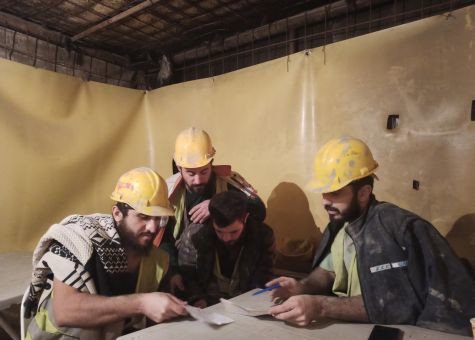
"We proceed by excavating meter by meter here. Sometimes, when we encounter a water source, we cannot proceed at all. We sometimes have to wait for months until the water source dries up. When the water is no more, we try to fill the void it has left behind by injections."
Two diplomas, but...
Cihan Aydın (27) graduated from two departments. He has a diploma from both the Atatürk University's Department of Furniture and Decoration and Uludağ University's Interior Architecture. However, these two diplomas did not suffice for Aydın to find a job in his own field of specialization:
"None of us is now practicing the profession that we gladly studied. As the saying goes, every profession is a golden bracelet. But our bracelets are either fake or made of tin, because there cannot be any other explanation for our situation here. I am neither a specialist in furniture nor an interior architect here; I have to do whatever I am told to do.
"Sometimes, I attach iron mats on excavators; sometimes, I give injections. I hope that the pandemic period will end as soon as possible and I go out and start looking for a job again. Otherwise, the economic hardships will force me to stay in the tunnel for the rest of my life."
'I would like to struggle against the virus'
Ferhat Sönmez is 24 years old; he graduated from the Department of Paramedic at the Plato University's Vocational School of Higher Education.
Sönmez says that since he graduated, he has been unable to find a job related to his field of study. "In a period when the disease is so intense, I would like to be a health worker and be outside, helping our people. But, I have been struggling against the COVID-19 pandemic in the tunnel."
Sönmez, the health 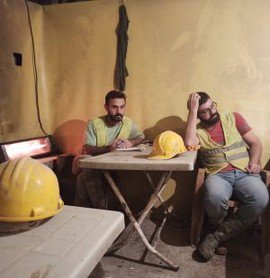 specialist of the university graduates' shift, then expresses the concern of hundreds of thousands of young people in Turkey:
specialist of the university graduates' shift, then expresses the concern of hundreds of thousands of young people in Turkey:
"There is a really huge lack of healthcare personnel in the country. But, the truth is that if you do not have a relative in the capital city of Ankara, the department where you studied does not matter and, that is why, I have started working as a tunnel worker. I will join the army for my mandatory military service soon. I hope that I will be able to start practicing my profession when I come back. Otherwise, I will keep struggling for my life as a tunnel worker."
He is both studying and working
The youngest of the group is Agit Sucu. He is 21 years old and he is a sophomore in the Department of Journalism at Fırat University. He says that when he encounters the university graduates inside the tunnel, he is discouraged from studying further:
"As our economic situation is not good, I saw this incident [outbreak] as an opportunity and started working immediately. I attend the online classes by using the internet at the construction site. Our chiefs and foremen care for my education. But, when I saw the graduates of journalism working here, I have been really discouraged from studying.
"On this path that I embarked on for the sake of truth, I have learned that the real truth is unemployment, which makes me drift apart from education. My family, future and life is a huge nothing."
Youth unemployment in Turkey
According to the figures of the Turkish Statistical Institute (TurkStat), the number of unemployed people in the 15-34 age group is 2 million 429 thousand in Turkey. More strikingly, with the onset of the crisis and the pandemic, only 45.1 percent of 24.2 million young people have been employed. When considered in terms of their education level, the number of unemployed people at the level of primary school and below is 770 thousand. This number is 698 thousand among secondary school graduates and 961 thousand among higher education graduates.
* Source: Platform of Young Unemployed
(SE/SO/SD)





